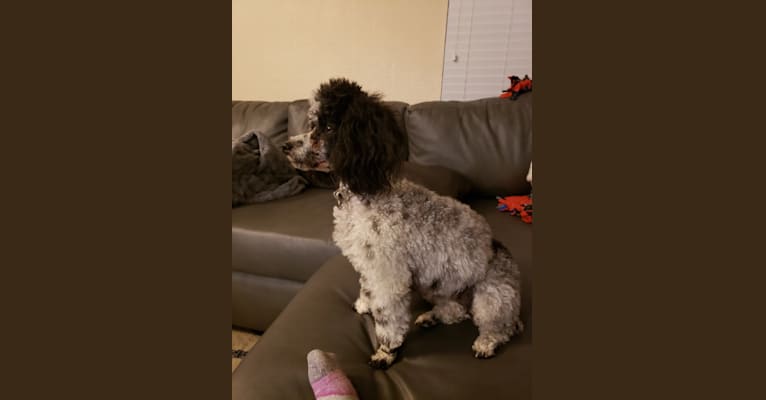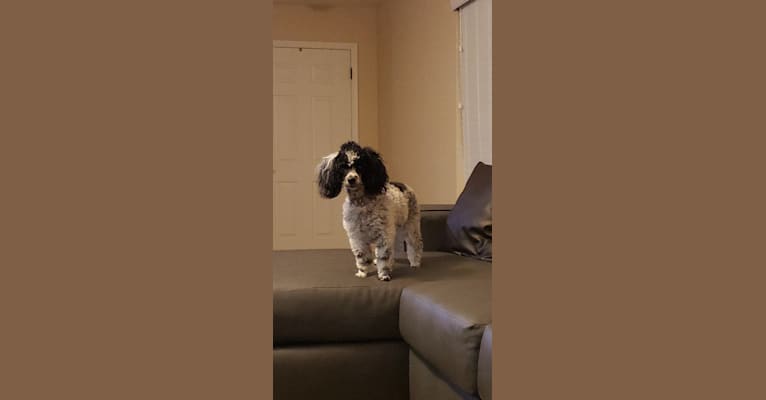Toodles inherited both copies of the variant we tested
No Dogs Available
It looks like you don’t have any dogs on your account yet. Activate a kit now!
“CONTINENTAL Kennel Club registered Parti Toy Poodle”
Place of Birth
Mexico
Current Location
Arizona, USA
From
Arizona, USA
This dog has been viewed and been given 0 wags
Registration
Continental Kennel Club
(CKC):
Start a conversation! Message this dog’s owner.
Explore
Changes to this dog’s profile
- On 1/17/2021 changed handle from "zues28" to "toodles321"
- On 1/17/2021 changed name from "Zues" to "Toodles"
Our policy is that each dog’s profile should accurately portray the dog to which the genetic reports belong.
To help ensure adherence to this policy, we show here any changes that have been made to the name or handle (web address) of this dog.
If you believe that this profile is in violation of this policy, you may contact us to report it.
Health Summary
Toodles is at increased risk for one genetic health condition.
Intervertebral Disc Disease (Type I)
How to interpret this result
Toodles has two copies of an FGF4 retrogene on chromosome 12. In some breeds such as Beagles, Cocker Spaniels, and Dachshunds (among others) this variant is found in nearly all dogs. While those breeds are known to have an elevated risk of IVDD, many dogs in those breeds never develop IVDD. For mixed breed dogs and purebreds of other breeds where this variant is not as common, risk for Type I IVDD is greater for individuals with this variant than for similar dogs.
What is Intervertebral Disc Disease (Type I)?
Type I Intervertebral Disc Disease (IVDD) is a back/spine issue that refers to a health condition affecting the discs that act as cushions between vertebrae. With Type I IVDD, affected dogs can have a disc event where it ruptures or herniates towards the spinal cord. This pressure on the spinal cord causes neurologic signs which can range from a wobbly gait to impairment of movement. Chondrodystrophy (CDDY) refers to the relative proportion between a dog’s legs and body, wherein the legs are shorter and the body longer. There are multiple different variants that can cause a markedly chondrodystrophic appearance as observed in Dachshunds and Corgis. However, this particular variant is the only one known to also increase the risk for IVDD.
Breed-Relevant Genetic Conditions
Von Willebrand Disease Type I, Type I vWD (VWF)
Identified in Small Poodles
Variant not detected
Progressive Retinal Atrophy, prcd (PRCD Exon 1)
Identified in Cocker Spaniels and Small Poodles
Variant not detected
Familial Nephropathy (COL4A4 Exon 3, Cocker Spaniel Variant)
Identified in Cocker Spaniels
Variant not detected
Glycogen storage disease Type VII, Phosphofructokinase Deficiency, PFK Deficiency (PFKM, Whippet and English Springer Spaniel Variant)
Identified in Cocker Spaniels
Variant not detected
GM2 Gangliosidosis (HEXB, Poodle Variant)
Identified in Small Poodles
Variant not detected
Neonatal Encephalopathy with Seizures, NEWS (ATF2)
Identified in Small Poodles
Variant not detected
Acral Mutilation Syndrome (GDNF-AS, Spaniel and Pointer Variant)
Identified in Cocker Spaniels
Variant not detected
Exercise-Induced Collapse, EIC (DNM1)
Identified in Cocker Spaniels
Variant not detected
Oculocutaneous Albinism, OCA (SLC45A2, Small Breed Variant)
Identified in Pekingese
Variant not detected
Osteochondrodysplasia (SLC13A1, Poodle Variant)
Identified in Small Poodles
Variant not detected
Additional Genetic Conditions
Explore
What is a linkage test?
DNA sequences that are close together on a chromosome tend to be inherited together. Because of this, we can use genetic variation surrounding a specific variant (i.e. "linked" to it) to infer the presence or absence of a variant that is associated with a health condition or trait.
Linkage tests are not as predictive of your dog’s true genotype as direct assays, which we use on most other genetic conditions we test for.
Traits
Explore the genetics behind your dog’s appearance and size.
No Result
For every test, we run multiple assays to ensure the accuracy of the results we deliver. For your dog, one or more of these produced inconclusive or low confident results. Therefore, we are not able to provide you with a result at this time.
Coat Color
No Result
For every test, we run multiple assays to ensure the accuracy of the results we deliver. For your dog, one or more of these produced inconclusive or low confident results. Therefore, we are not able to provide you with a result at this time.
Other Coat Traits
No Result
For every test, we run multiple assays to ensure the accuracy of the results we deliver. For your dog, one or more of these produced inconclusive or low confident results. Therefore, we are not able to provide you with a result at this time.
Other Body Features
No Result
For every test, we run multiple assays to ensure the accuracy of the results we deliver. For your dog, one or more of these produced inconclusive or low confident results. Therefore, we are not able to provide you with a result at this time.
Body Size
No Result
For every test, we run multiple assays to ensure the accuracy of the results we deliver. For your dog, one or more of these produced inconclusive or low confident results. Therefore, we are not able to provide you with a result at this time.























